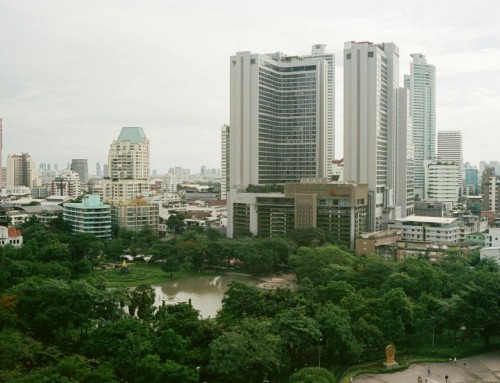To most people, their property is perhaps the single largest financial commitment that they will enter into for their entire lives. This is one of the reasons why property investment is usually at the forefront of most people’s thinking when they are looking to start investing. As an asset class, property is seen as one of the safest. On top of that, there is a utility value attached to the property if the owners are using it as their abode. Let us break down to truly understand this asset class and perhaps we can make sense of the property market.
Property has two main components, the first is the land and the second is the structure which sits on the land. Prices of land can fluctuate from time to time and in general, the value of the land should appreciate over time. The structure which sits on the land, on the other hand, is a depreciating asset. Like a car or a mobile phone, the structure can go out of style, suffer from wear and tear and damages and in general, the value of the structure should depreciate over time. Let us now delve deeper to understand both these components.
The land component
Land is generally considered a scarce commodity and thus it can be said that over time, land values do appreciate over time. This is especially true for plots of land that are located within a city centre with a large amount of business activity and commerce. In cities like Singapore, Hong Kong and Bangkok, large multinational corporations (MNCs) often set up regional offices in the business districts and bring along many of their staff to work in these offices. These individuals who are relocated to these cities will naturally require a place to stay and thus there will be a demand for properties to rent. On top of bringing staff from overseas into these cities, these MNCs will also hire locals. This will invariably help to generate wealth in the local population and with knowledge and technological transfer, these locals will also invariably see their incomes rise. This, in turn, will fuel the demand for properties in these cities especially around the areas with business and commerce.
The supporting industries that will spring up in these areas are also significant. Where there are people, there will be retail malls, cinemas, bars, restaurants and many other industries that can benefit from this influx of people. This is the reason why when you go to major cities around the world, the best restaurants, cafes, bars, high-end luxury fashion outlets are located in the heart of the city centre, close to where most of the main business activities and commerce take place. If you were to take large cities like Bangkok, Hanoi and Kuala Lumpur, you can see that as you pan further away from the city centre, there are fewer restaurants, cafes, bars and shopping malls. The best restaurants want to attract the best customers who can pay top dollar for their food. The best solution would be to set up shop in the heart of the city where there is a higher concentration of expatriates and wealthy locals.
Scarcity of land is only true in areas where population density is high. Places like Monaco and Singapore, which are second and third in terms of most densely populated cities or territories (Macau is first and Hong Kong is fourth), tend to find that land prices appreciate much faster than say Omaha or Kansas in the U.S. With a higher population density, demand for the same prime land is higher and this pushes prices higher.
The value of land is also linked to income levels. So long as incomes of inhabitants in the area are rising, land values of that area will rise as well. In an ideal scenario, the rise in incomes and land values should move in tandem. However, in many instances, land values rise faster than income levels. This can be due to cheap and easy credit and in general an over-simplification that in the long run, property investments will generate a profit. Human behaviour will always result in bubbles being formed and like all bubbles, they have a tendency to pop and that was what happened in 2007 which led to the Global Financial Crisis or what we now refer to as the Great Recession.
The desirability of the area is the next determining factor when it comes to land value. In cities like Sydney and Vancouver, prices of properties rose because there was very strong buying activity from buyers from abroad. In most cases, the Chinese. These cities are deemed desirable for retirement or maybe some buyers purchased these properties so that their children could live in them while they studied and worked abroad but in all, this demand far outstripped the supply of what was already a very limited resource, land.
The structure component
Just like a car, or any machinery, a structure will depreciate over time. As weather and wear and tear happens over time, wood flooring and paint may need to be worked on and this will cost money. A dated house may also need to be remodelled and this will cost additional time and money. If the property is a condominium whereby there are many stakeholders owning individual units on the same plot of land, it would most probably be how efficient the development as a whole is managed by the management committee. If it is a singular house that sits on the land, it is up to the sole owner to maintain the structure. If maintenance is done well, the depreciation of the structure can be slowed. Even so, building techniques, materials and design do improve over time and no matter how well maintained a structure is, it will definitely depreciate as time passes. This is a reason why in most countries, there are laws in place to govern how structures have to be maintained. Also, after a structure has aged over time, the structure owner may decide to tear down the structure and erect a new one instead.
In places whereby there is little to govern how structures should be maintained, there is a very large premium for new developments as compared to older ones. This premium should be lesser in cities where older developments are better maintained. This premium should also be higher in places whereby foreign buyers make up a large proportion of buyers. This is because foreign buyers do not have the time and local knowledge to engage contractors to refurbish and renovate an older structure.
Putting the land and structure components together
Understanding that the price of a property is the sum of these two components is a good start to understanding property pricing. Typically newer developments will be priced at a higher price than older developments in the resale market due to the fact that the value of the structure has depreciated, all things else being equal. If the lease of the land has a tenure and the older development has a shorter tenure, this will show in a lower value in the land component as well as the structure component. If a new development has a fresh lease of perhaps 99-years with a new structure and the older development has an old structure sitting on freehold land, the question then comes round to the fact of how much premium is the freehold land over the leasehold one and how much more does a new structure cost compared to the older one.
My analysis of land and structure is oversimplifying the matter but I feel that there is a need for buyers to understand this structure to better understand property pricing. There are other factors like the presence of negative externalities like proximity to a noisy road or positive externalities like a property being close to good schools or that the property is in a desirable neighbourhood. On top of that, certain plots of land may have guidelines that may influence how tall or how many units a development can contain. These guidelines are set by governments and altering these guidelines will also alter the value of the land.
Next up. let us try to view property from different perspectives
Property as a basic need
The difference between property and other asset class like maybe stocks or gold is that shelter is one of our basic need. Everyone will need a shelter and this is the main reason why when property prices start to rise faster than fundamentals, it is usually one of the main drivers of inflation and a huge concern for governments when it comes to social cohesion. Unlike the stock market, just about everyone is affected directly by the property market. This is where governments around the world have to try to reign in property prices if it moves ahead of fundamentals. Fundamentals being wages. Discontentment with rising property prices can result in social unrest and distrust of the government. This is clearly evident in cities like Hong Kong where housing is the least affordable.
Property as a commercial tool
Next, we have to look at property as a commercial tool. Businesses will need office spaces, shops and warehouses. The main expense of a business is raw materials, wages and rent. If rents continue to increase in an upward trajectory, businesses will either have to absorb this as an added cost, cut costs either in raw materials or wages or pass this cost on to the consumer. If rents continue to rise, businesses will inevitably have to pass the cost on to the consumers by raising the prices of their products. This is called cost-push inflation where prices rise not because there is more demand for the good or service but because the cost of supplying the good or service has increased and the business owner is merely passing on the increase to the consumer.
Commercial property is currently seeing a seismic shift in consumer behaviour and with more people shopping online and with the current pandemic, many shopping malls and offices may be deemed irrelevant in the current predicament. Online shopping platforms are not as adversely affected when it comes to landlords raising commercial rents and as technology improves, the need for a physical office for some companies may disappear.
Property as a debt
Property prices are correlated to the demand for property and the demand is in turn correlated to peoples’ incomes and their ability to obtain credit. For cities whereby incomes are high and are rising, property prices should and in most cases have risen accordingly. However, for many cities around the world, property prices have been rising while peoples’ incomes have been stagnating. The only reason for this would be the availability of easy and cheap debt. This easy and cheap debt was the cause of the 2007-2008 subprime mortgage housing crisis in the U.S. and this very same easy and cheap debt is now prevalent in many cities around the world. 90 per cent financing may be possible in some property markets and if you were to go back into the stock market and compare that to financing that is available for people to buy stocks, there is seldom 10 to 1 financing in the stock market. If the property appreciates by 10 per cent, you would have doubled your equity but if the property price depreciates by 10 per cent, effectively the 10 per cent down payment that was placed is gone.
Property as a speculative tool
How some people think of property is as a speculative tool. Many do not admit to this fact but they do treat their property as a form of speculation rather than a shelter. The idea that someone is buying a house and the most important criteria is whether he can sell off the property for a profit after a certain number of years does sound a bit like someone speculating on the stock market. To homebuyers who are looking for a shelter, they will be concerned with whether the property fits their family’s needs, whether it is a good neighbourhood and whether it has adequate amenities. On the commercial property side of things, many landlords may get caught out because they went into investing in their commercial property with the expectation that the economy would continue to rise and rentals would follow suit. Most of them took up huge loans for their property purchases with very long loan tenures. It is actually rather foolish to enter into such a loan with the expectation that a recession will not punctuate a 20 or 30-year loan tenure at least once or twice but this is the reality of the situation we live in. With the closure of business activity due to the current pandemic, businesses may terminate their lease or fold and landlords may have to accept significantly lower rents on their properties. On top of that, in many markets, it is actually possible to use the income from one property to obtain a loan for another property. This invariably sets in place a chain reaction when one property does not get rented, that loss of income will affect the lender’s ability to finance the subsequent properties. The fact that many people do not realise that they view property as a speculative tool means that not many can see that bubbles do form and have a tendency to burst.
Property as part of an overall portfolio
Many people understand the notion of never putting all your eggs in one basket but this is what putting all your money in one property is. If you are buying a property for shelter and not as a speculative tool then understand that you are treating property as a basic need. To those wanting to speculate, please be critical about the investment that you are entering. Understand that property investment is usually highly leveraged, illiquid risky and undiversified asset especially if you only buy one. Analyse a property in the same manner that you would a stock on the stock market and I think many people would do just fine. Thinking that property prices will invariably go up in a straight line only serves to oversimplify an asset class that has seen sharp rises and falls over the decades. Just because there has not been a major recession for the last 11 years doesn’t mean that there will not be one moving forward.
In conclusion…
Economists view of the economy as consumers having unlimited wants and we have to satisfy these unlimited wants with the limited resources that we have. In this aspect, land is a limited resource and so is money. We can then choose to put this money to work by building a factory, buying machines and creating more goods to better fulfil our unlimited wants. This is where building a property then seems to be counterproductive to the economy. Buying multiple properties does not actually contribute to the economy. To make an economy function, we have to put money to work in companies which will then invest in machinery, purchase raw materials and eventually produce more goods to fulfil society’s wants. This is how an economy will grow and this is why governments around the world are scrambling to save businesses during a pandemic like today. Businesses are the backbone and main drivers of the economy and if making money was as easy as placing it in any random property and waiting for it to rise over time, this would discourage people from investing in their own business. The economic goal of governments should be to increase the productive capacity of businesses so that more goods and services can be provided for the economy. Property speculation is not producing anything useful for the economy and if property prices rise because the underlying economic fundamentals have improved, then that is legitimate gain but if not then this paper wealth increase should not be construed as something that can go one forever.
Now do not construe my argument as being against property investment. What I am saying is that if the fundamentals are right, property prices should rise because of these fundamentals. Property investing should not take on a different investment analysis as compared to when a person is investing in a stock on the stock market. If we were to look at a company like Apple and decide whether it is a fundamentally sound investment, we would take a look at its product line, its ability to attract clients to its product and its unique quality which makes it stand out in a crowd of tech companies on the stock market. Similarly, we should be searching for the right property, in a good location and with qualities that will make it desirable to live in. In the last five years, Apple Inc.’s stock price had appreciated from about US$100 to about US$300 today. I am not advocating everyone to jump on the stock market bandwagon and I would expect Apple Inc.’s stock to decline in value as the recession pans out but perhaps we should look at the fundamentals a little more when investing in property. In most cases, buying a property is one of the largest financial decision of a person’s life.
Yours Sincerely,
p.s. If I told you that you could own millions of dollars of stocks on the stock market with little or no money, alarm bells would go off immediately. Yet there are adverts peddling that it is possible to own multiple properties with little or no money down and people are paying thousands of dollars to learn this secret. If it sounds too good to be true, it probably is. Let’s focus on the fundamentals.






